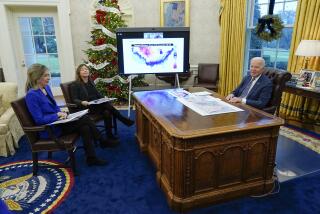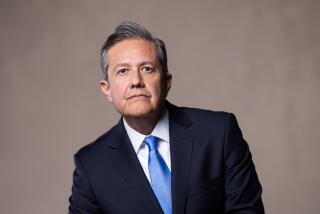Young doctor Julissa Gutiérrez is new head of L.A.’s Honduran Consulate. Can she heal it?
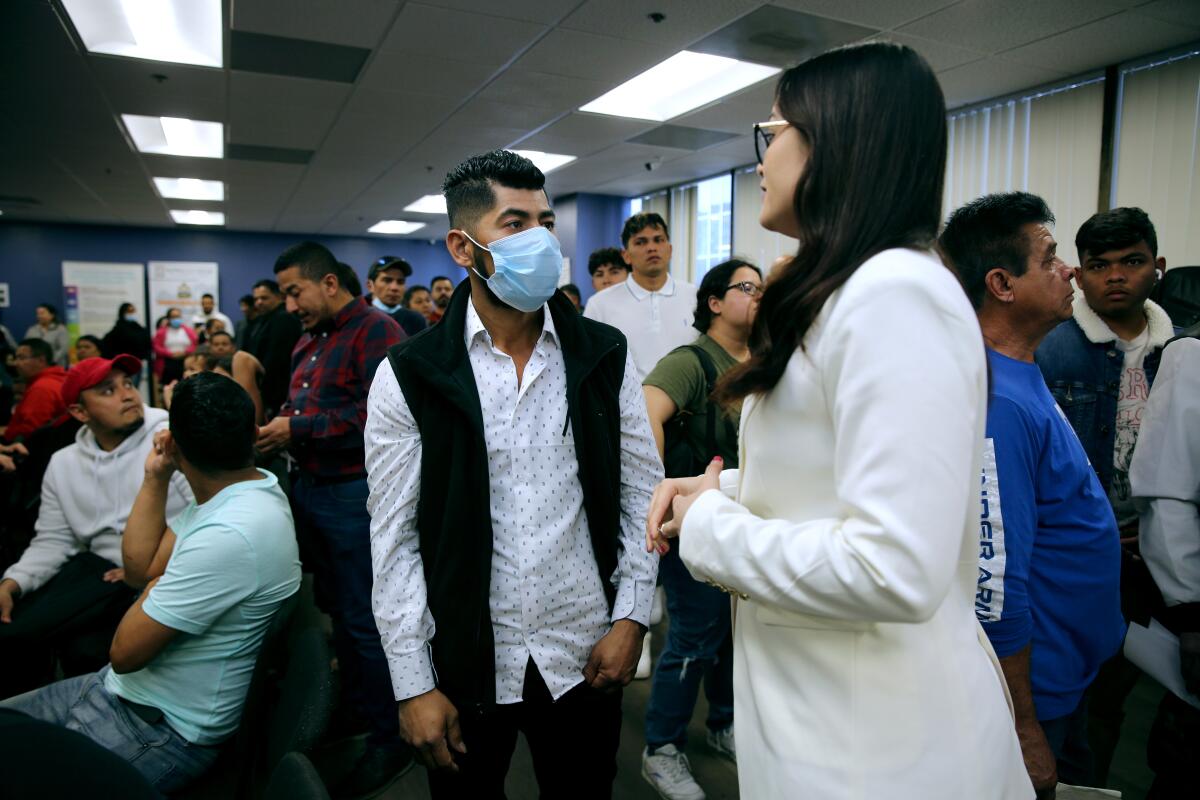
- Share via
Julissa Gutiérrez is a doctor by profession.
So perhaps it’s not surprising that she wants to use her new role as head of mission at L.A.’s Honduran Consulate to heal her community. She aims to do that by treating constituents humanely, streamlining essential services and breaking with the past practice of favoring those with connections to Honduras’ political rulers.
On a recent, typical morning, Gutiérrez stepped into the consulate’s packed main hall. Questions and requests rained down on her as she interacted with constituents. It’s been standard business since the 28-year-old was appointed chief of mission on March 20, replacing Vice-Consul Grace Sierra.
“I go out every day. I am very active,” said the official sitting in her office in Koreatown.
Originally from Tegucigalpa, the capital of Honduras, Gutiérrez was appointed vice-consul in October and took up her position in Southern California on March 6 after receiving training in the basics of her job: civil registration, immigration and legal issues.
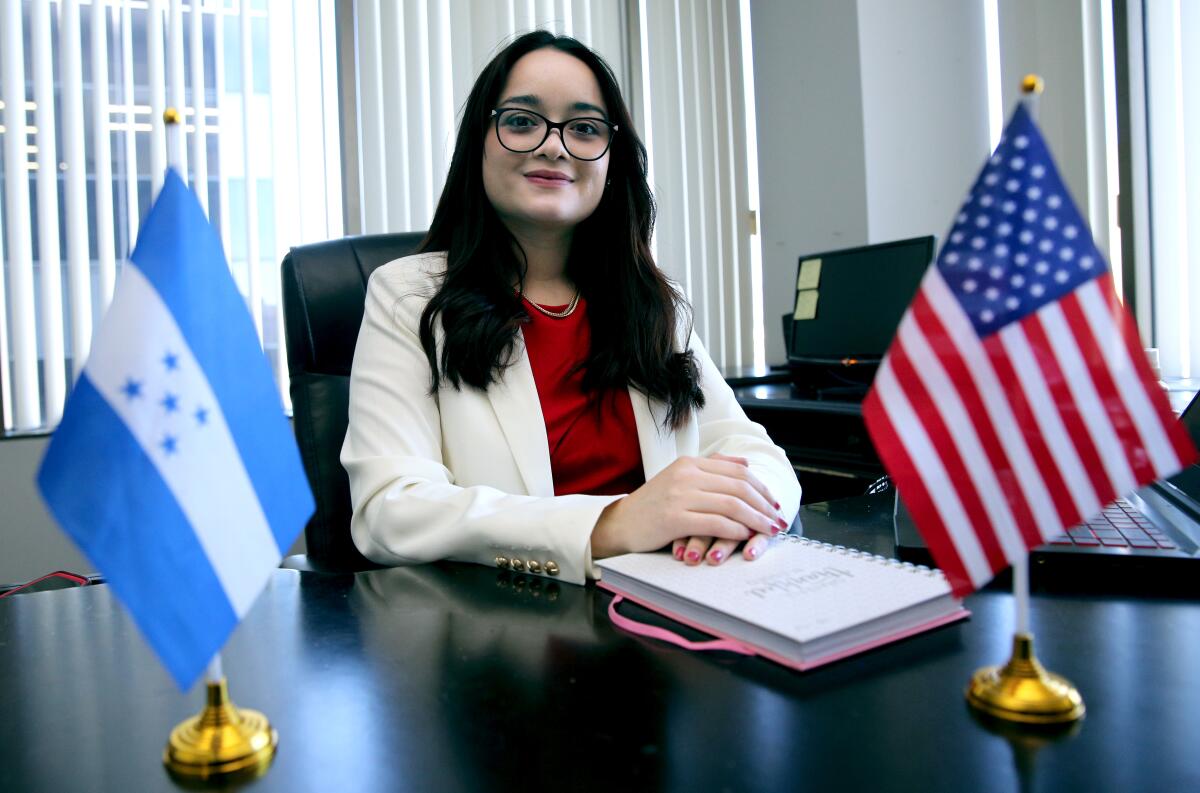
Since her first day in Los Angeles, she has done a lot of listening, as she was doing the other day. One woman asked what steps she needed to take to process a passport for her daughter, whose father lives in Honduras.
“He has to give you an authorization,” Gutiérrez replied.
“But you have to bring the original document,” she stressed when she observed that the mother was toting a bunch of photocopies.
Poised and knowledgeable, in less than 15 minutes Gutiérrez fielded a flurry of other queries as if her field were diplomacy or administration rather than medical science. The consular office she oversees serves some 43,000 people of Honduran descent living in Los Angeles County, as well as Honduran immigrants living in southern Nevada, Arizona, Utah and Hawaii. Stamina and a calming bedside manner are practically prerequisites for the job.
“This is new, but I have the capacity to face it,” said Gutiérrez, who received her degree as a doctor of medicine and general surgery from the Catholic University of Honduras in 2021. She went on to study at the Pedagogical University to become a higher education teacher.
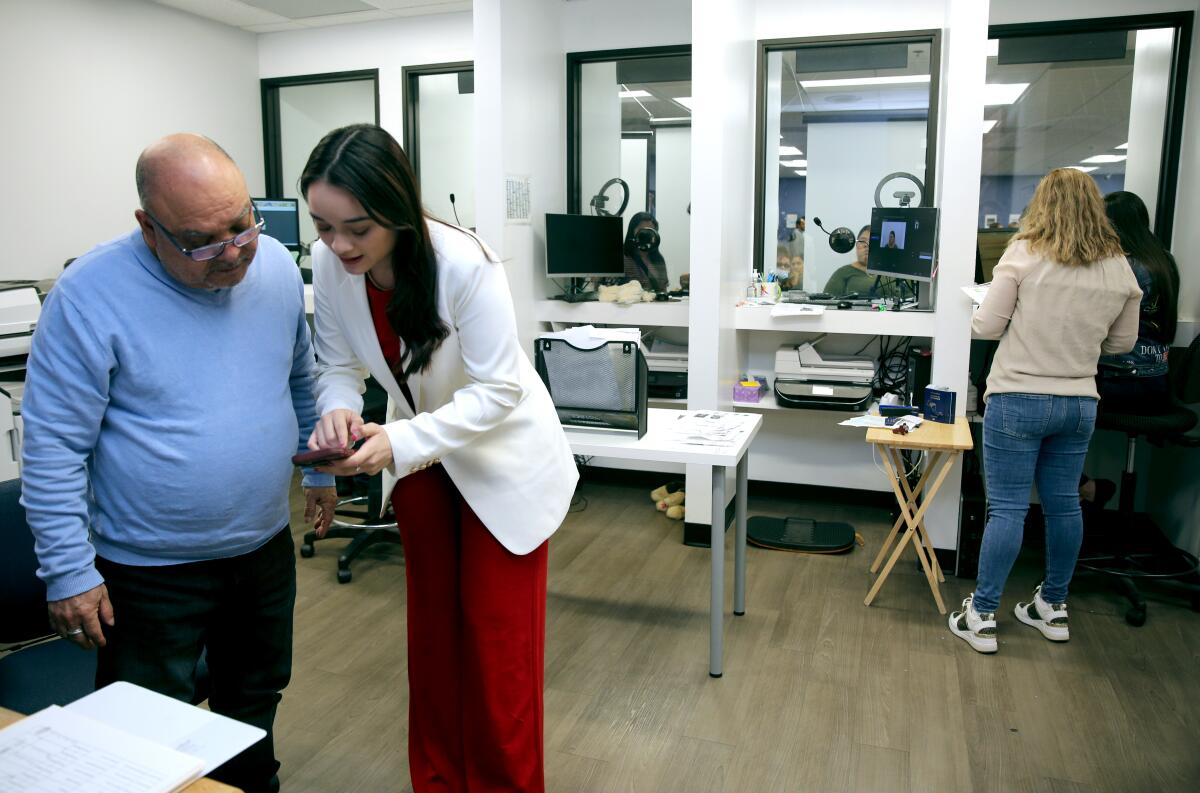
She comes from a family of healers. Her mother, Julissa Villanueva, is a forensic pathologist who currently serves as vice minister of security in the government of President Xiomara Castro. The young doctor-diplomat also is the granddaughter of Eduardo Villanueva, a lawyer and former director of the Honduran agency in charge of investigating and evaluating the national police.
“I have two very great examples,” she said of her relatives.
In 2022, Gutiérrez was hired at the Ciudad Mujer center, an organization that provides women with expert counseling and care in domestic violence prevention, sexual health, community education, economic autonomy and women’s rights. It operates in Tegucigalpa as well as in the cities of San Pedro Sula and Choloma.
Her job as deputy manager included completing and monitoring applications to obtain donations from the international community, organizing medical brigades and addressing human rights issues.
In her new diplomatic role, she wants to turn the consulate around and make it more than simply a service provider. She aims to make it into a true community center, where her compatriots can obtain not only documents but also specialist services such as health workshops and legal advice.
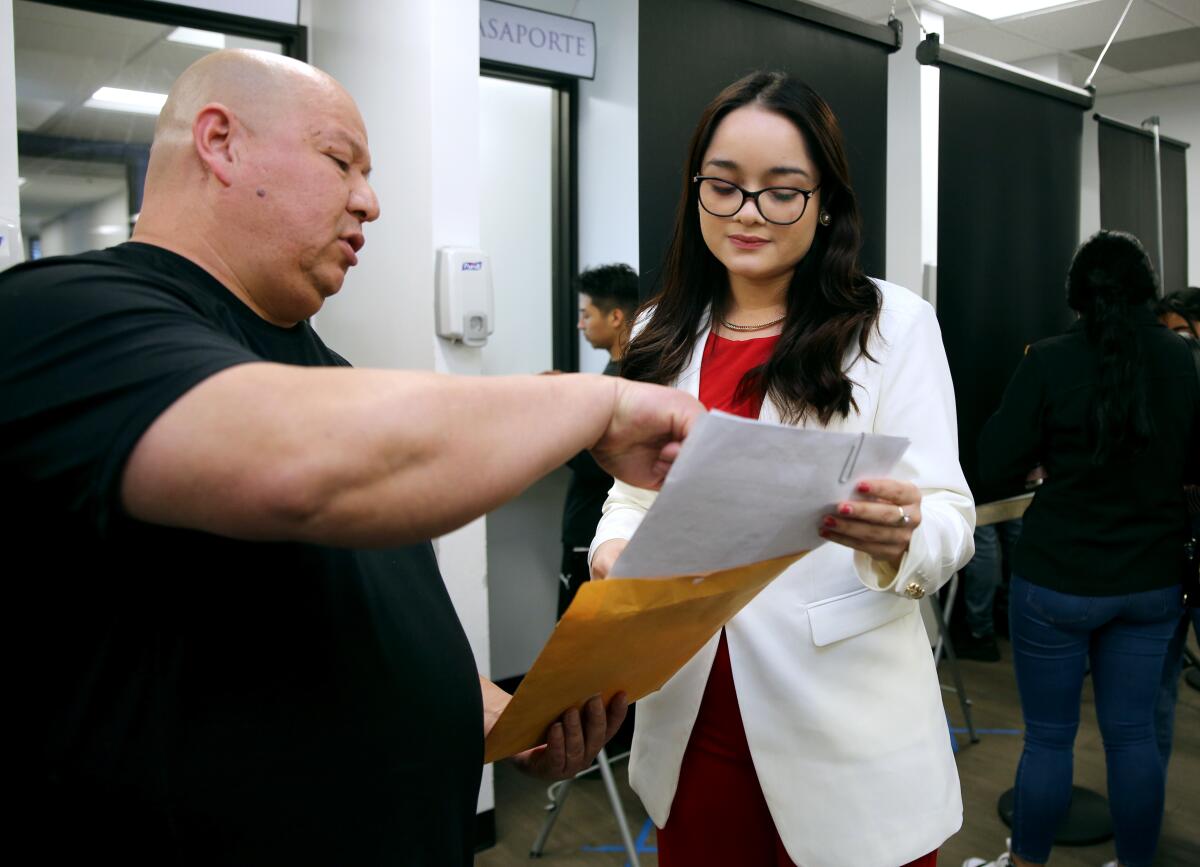
“When I am asked to come to the consulate, definitely [there are people who] say, ‘What is a doctor doing there?’ But what is it that we cannot do?” she asked rhetorically. Her belief in herself, and in her community’s ability to achieve more, stems from her staunch Roman Catholic faith.
The doctor’s consular appointment reflects the political shake-up in Honduras since Castro, of the left-wing Liberty and Refoundation party, became the nation’s first female president, on Jan. 27, 2022, and changes were announced in the Honduran consular network in the United States. Gutiérrez was the first consular appointment at the local level by the new government.
“The government is just beginning to take over the consulates,” said José Bautista, an activist with Indignant Hondurans of Los Angeles, an association sympathetic to the Liberty and Refoundation party.
“We hope that the consulate will have a different face, a more dignified treatment for the Honduran community and that more personnel will arrive,” added Bautista, originally from Honduras’ Cortés province.
Among the challenges the consulate faces is engaging more and building trust with the local community. In the past, the consulate drew criticism for being perceived as favoring local organizations that shared the political leanings of the Honduran administration.
“The consulate can help us promote our businesses. It is important that it be close to organizations and businessmen alike,” said Maynor Sandoval, a native of Yoro province and co-owner of the Doña Bibi’s restaurant in the MacArthur Park neighborhood.
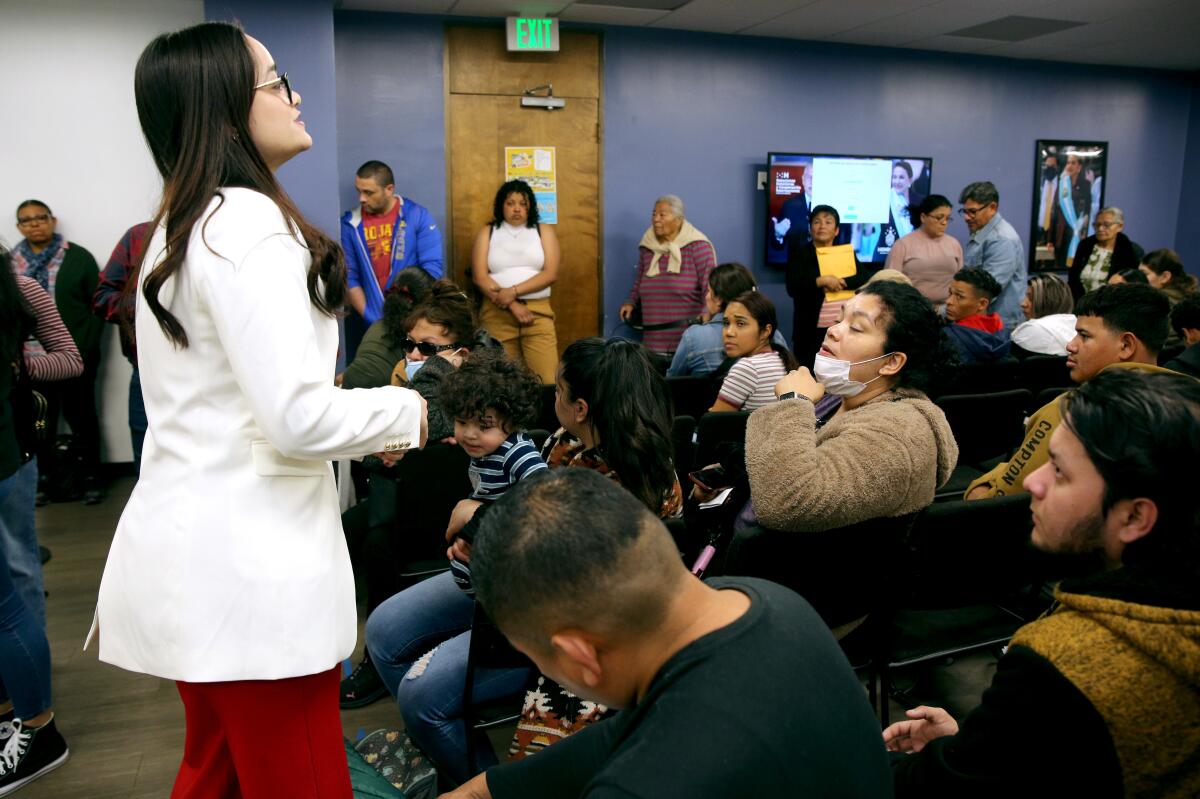
Honduran historian Suyapa Portillo believes that the tenure of the new consular management could mark a watershed if it can advance community inclusiveness and unity. The Pitzer College professor, originally from Copán province, said that when she began to denounce the breakdown of the rule of law in her homeland after a 2009 coup d’etat, she became persona non grata at the L.A. consulate.
“After I started writing about the problem of the coup d’état, they didn’t invite me again,” she said.
“I would love to see a pluralistic consulate that attends to the different communities,” Portillo said, adding, “The consulate has to assist all Hondurans, regardless of the color of their political party, religion or skin color, or anything like that.”
Gutiérrez understands the challenges ahead. She emphasizes that the Honduran Foreign Ministry has instructed her to eliminate “past practices.” She wants to listen to suggestions from a variety of groups about improving consular services and community outreach.
“Here, the doors are not going to be closed to anyone because of a political color,” she said.
Since September, the consulate had been operating with only five employees, including the head of mission. Now there are seven employees, and more full-time positions are expected to be filled to replace several dismissals made by the Foreign Ministry last year.
With the support of volunteers, the consulate has begun to bring order to its facilities. But social networks still resound with complaints that messages from constituents still often go unreturned. Plans call for initially adding one staffer on each weekend day to respond to questions posed on Facebook and Instagram.
“We are going the extra mile to be able to serve more than 200 users who come daily,” the new consul said.
Gutiérrez acknowledges that she’s not accustomed to holding a desk job, which is one reason why, in a pinch, she’s willing to get up and fill in for her colleagues staffing the service counter.
“If I had more staff, I would just focus on management,” she said.
Another of her first measures was to coordinate with a clinic for its staff to offer daily informative talks on health issues; about 70 people attended the first one, on April 15. She plans to recruit immigration lawyers to do the same. And she wants to assist and empower women in dealing with gender-related violence prevention.
Also on her to-do list is opening the consulate one Saturday per month for her compatriots to process the national identification document, known as DNI; bolstering consular protection for human rights, including those of detained immigrants; and promoting Honduran art and culture.
“The message that I can give my compatriots is that for them to feel that this space is their home, a safe space, in which services will be provided with quality, warmth and transparency,” she said.
More to Read
Sign up for Essential California
The most important California stories and recommendations in your inbox every morning.
You may occasionally receive promotional content from the Los Angeles Times.
